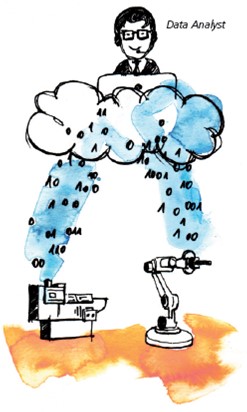One significant feature of Industrie 4.0 is the consistent networking and penetration of all fac-tory components as well as complete value-added chains with sensor technology, embedded systems and communication technology – which is called cyber-physical systems. This results in large amounts of data, usually generated by machines, ranging from planning the products to be manufactured and the production resources to actual production and the uses of the products. This data forms the basis of modern and powerful analysis and evaluation methods, which are called “artificial intelligence” (AI) today. AI procedures are capable of “coping with new situations successfully, processing new data or new information, drawing conclusions from the available knowledge, thus generating new knowledge (…) or solving new task.” [1] Today, it is widely accepted that AI is a key technology that allows all users to make use of large potentials for improvement in all stages of the value chain.
Even though current trials certify that Germany holds a good position in AI research, they also state that AI applications are far more competitive. China is making tremendous investment in Artifical Intelligence – and Chinese companies will enter the German market for AI applica-tions in production in a few years. Therefore, the Federal Government is absolutely right to state, in the context of its AI strategy, that they intend to make Germany and Europe a lead-ing AI location. [2] Industrial production is one of the most important fields of application in this context. Using Smart Factories and specific and challenging practical cases from our customers in industrial manufacturing, we have already started to develop innovative AI methods and tools, which will be briefly presented in the following sections.
[1] PaiCE (Ed.): Study Potentials of Artificial Intelligence in the Manufacturing Sector in Germany(in German language only)
[2] Strategy Artificial Intelligence oft he Federal Government, see www.ki-strategie-deutschland.de(in German language only)
 Fraunhofer Institute of Optronics, System Technologies and Image Exploitation IOSB
Fraunhofer Institute of Optronics, System Technologies and Image Exploitation IOSB 
